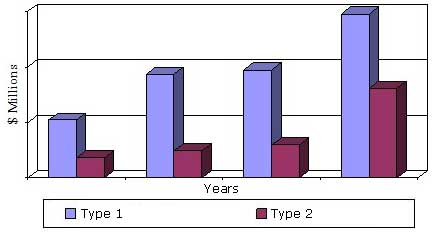Despite Treatments, Diabetes Cases on the Rise in the U.S., Demand for Incretin Therapies Steadily Growing
April 08, 2015
Wellesley, Mass., April 08, 2015 –BCC Research (www.bccresearch.com) reveals in its new report on incretin-based therapeutics that diabetes, connected to obesity, is and has been on the rise globally, and new treatments are being developed and used to deal with the varying types and stages. It is a chronic disease whereby blood sugar cannot be effectively regulated because the pancreas does not produce enough insulin or the body cannot effectively use insulin.
According to the American Diabetes Association, 29.1 million Americans — 21 million of who were diagnosed and 8.1 million of who were undiagnosed — had diabetes in 2012, with the vast majority (approximately 90%) having Type 2 diabetes. The World Health Organization (WHO) projects deaths from diabetes to double globally from 2005 to 2030 in part due to increasing rates of obesity around the world. Given that half of diabetes patients — 90% of whom have Type 2 diabetes that may or may not require insulin — do not have adequate control over their blood sugar despite taking medications, a need exists for improved therapies.
Despite the numbers of diabetics and treatments, nearly 50% of patients with this condition fail to meet their glycemic target. To counteract this situation, incretin-based therapies are designed to further provide glycemic control for diabetics when diet, exercise and possibly a first-line therapy such as metformin are not adequate. They can be stand-alone treatments that, in some cases, even delay the start of insulin or reduce the need for it, and can also augment actual insulin therapy itself or other medications such as metformin.
The field of incretin-based therapies, also called incretin mimetics or incretin enhancers, has moved in the span of the last decade to be at the forefront of glycemic control in diabetes patients worldwide. “The prescription volume for incretin-based therapies has been steadily rising, particularly because so many diabetes patients are failing to reach goals for blood sugar levels (HbA1c, glycated hemoglobin expressed as either HbA1c or A1c),” says BCC Research analyst Kim Lawson. “Beyond glycemic control, incretin-based therapies, particularly GLP-1 receptor agonists, offer weight loss promotion and possibly cardioprotective attributes.”
Incretin-Based Drugs: Markets for Diabetes Therapies and Developing Treatments includes the growth potential for incretin-based therapies over a five-year period from 2014 through 2019. The key objective is to present a comprehensive analysis of the current therapy technology and drug development market and its future direction, with the aim to first define and classify that technology as it pertains to therapeutics.

Editors and reporters who wish to speak with the analyst should contact Steven Cumming at steven.cumming@bccresearch.com.
Incretin-Based Drugs: Markets for Diabetes Therapies and Developing Treatments( PHM162A )
Publish Date: Feb 2015
Data and analysis extracted from this press release must be accompanied by a statement identifying BCC Research LLC as the source and publisher. For media inquiries, email press@bccresearch.com or visit www.bccresearch.com/media to request access to our library of market research.
BCC Library Membership Benefits
Unlimited Access to Market Research Reports for Academic Institutions and Corporations.
Custom Research
Tailored solutions across industries for your unique business needs.
More in Pharmaceuticals
- Global GLP-1 Analogues Market to Reach $268.4 Billion by 2030
- AI in Clinical Trials Poised for Rapid Growth with a 22.6% CAGR Forecast
- Global Immunotherapy Drug Market Projected to Reach $467.4 Billion by 2030
- Viral Vector Market to Grow 24.6% Annually Through 2030
- Brain Tumor Therapeutics Market to Grow at 11.1% CAGR Through 2030
Reports from Pharmaceuticals
Recent News
- Global Botanical and Plant-Derived Drug Market Projected to Hit $58.1 Billion by 2030
- Global Protein Expression Market Poised for 10.9% CAGR Expansion by 2030
- Vision Care Market Poised for a Tech-Driven Revolution
- Thermo Fisher Scientific Inc.: BCC Research Releases Comprehensive 360° Company Analysis
- BCC Research Forecasts 7.5% CAGR for Global Biological Cancer Therapies Market
